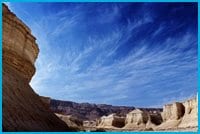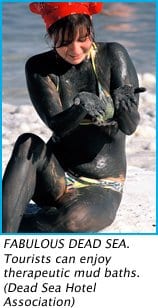
HUGE ROCKS. Breathtaking mountains surround Israel's Dead Sea. Credit: (Richard Burnett)
Israel is a gay oasis surrounded by an antigay desert. On Mar 28 openly gay Arab activists held a one-day conference in Haifa to spark discussion about gay life among Israel’s one-million Arab citizens and on May 11 the Red Sea resort town of Eilat held its sixth annual Pride Festival at Papaya Beach. In June Tel Aviv saw some 10,000 people attend its Pride parade.
On a recent visit I felt firsthand the weight of history in Old Jerusalem when my friend and guide, Tsion, brought me to the Western Wall and then inside the synagogue of the Western Wall. I walked in the footsteps of Jesus of Nazareth along the Via Dolorosa (“Way of the Cross”), from the first station where Jesus was sentenced to death by Pontius Pilate to the 14th station where Jesus was nailed to the cross at Calvary. Here every stone speaks.
It’s appropriate that gay activists wanted to hold their Pride parade in Old Jerusalem last November. It also came as no surprise to me that the Holy City’s ultra-conservative rabbis, priests and imams — who rarely ever unite over anything — successfully lobbied to cancel the parade.
“Jerusalem is where we pray,” one Israeli told me. “Tel Aviv is where we play.”
Even openly gay Israeli filmmaker Eytan Fox — whose feature film Yossi and Jagger chronicles gay Israeli soldiers in love — once told me, “I don’t like what Jerusalem represents. It’s all about religion and land. Quite frankly I’d prefer a peace march to a gay march.”
When in Jerusalem I made a point of visiting Yad Vashem, the Holocaust Martyrs’ and Heroes Remembrance Museum. It was a very moving experience but during my admittedly brief tour (one hour versus the three hours one really needs to explore this place) I’m afraid to report that I found not one word about the gay victims of the Holocaust — and it bears repeating that Gestapo head Heinrich Himmler himself once boasted that the Nazis murdered one million homosexuals between 1939 and 1944.
Before I left Jerusalem I found Shushan, that city’s lone gay bar, which has become a cliché among the Western press corps.
“Shushan, hospitals and gyms are the only places where everybody mixes,” one US reporter told me.
It was here that I chatted up a deaf Jew for two hours before we stepped outside to, uh, make out. I later went home with a Palestinian. You see, I love all men. We could have negotiated our own peace treaty during a threesome.
Over in Tel Aviv the gay scene is much more dynamic with two bathhouses, drag shows at Diva and easygoing twinks and dykes at Evita (31 Yavne) where you can pick up a map of the city’s gay hotspots and where bartender Yael will become a fast friend.
In a city where gay clubs open and close practically every six months, it was shocking to discover perennial favourite Carpe Diem recently closed. But it was a relief to see another of this city’s gay institutions, the dyke bar Minerva with its adjoining art gallery (78 Allenby), still going strong.
As I travelled around Israel I checked out the must-see ruins of Caeserea, one of the most important port cities in the ancient world built by Herod the Great. Here I was dazzled by Herod’s giant ampitheatre, the remains of a hippodrome similar to the one used for the chariot races in Ben Hur, a marble bathhouse, Roman and Byzantine ruins and buildings left by the 13th-century Crusaders.
I also bumped into a few gay people while travelling from spa to spa across this soccer-mad nation. My favourites were the ultra-polished Carmel Forest Spa Resort — the number one spa in the Middle East and one of the top 10 spas in the world, it could easily host a Gay Spa Week for circuit party queens — and, on the eastern slopes of Mount Canaan, the very romantic Mizpe Hayamin Hotel and Spa with its amazing rooms. But nothing beats floating in the Dead Sea, where I practised my synchronized swimming moves, and getting a therapeutic Dead Sea mud bath at my hotel.
Just a few kilometres away stands Masada, the fortress built by Herod the Great in the first century BC. Masada was the last stand of Jewish freedom against Rome in 74 AD. When Roman Governor Flavius Silva finally breached Masada’s walls he found more than 900 Jewish rebels had committed suicide rather than submit to the power of Rome. Whether you are Jewish, Arab, gentile or gay, Masada remains one remarkable testament to freedom.


 Why you can trust Xtra
Why you can trust Xtra